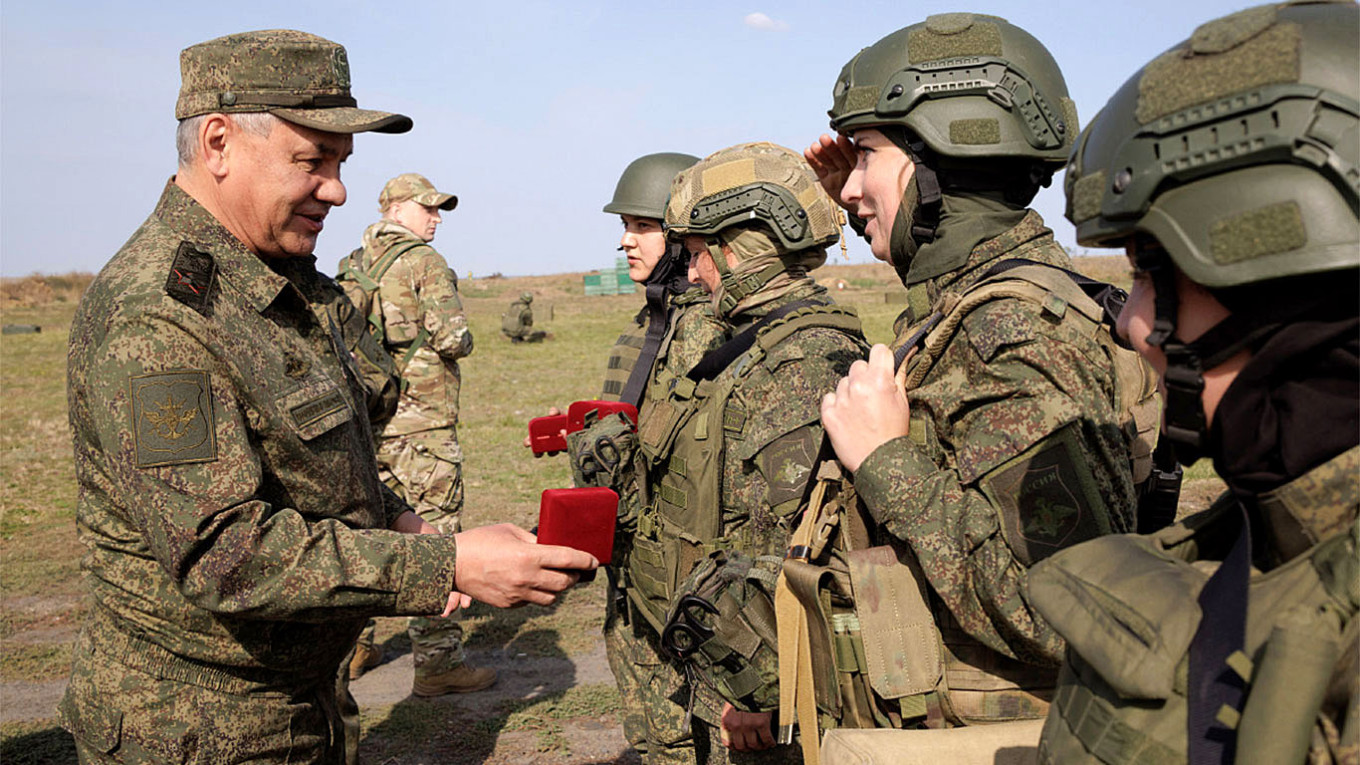Who fights for Russia in its war in Ukraine? Until now, the answer has been clear: men. Women are scarcely found among the Russian soldiers who have invaded the country, occupied its territory, killed and been killed, and committed some of the most horrifying war crimes that we have seen in the recent past.
But there are some signs that this could be changing. In October 2023, the Borz Batallion of Redut, a mercenary group under the control of Russia’s Defense Ministry, posted an advertisement on Russian social media seeking women for combat roles in Ukraine. This follows reports in July 2023 that the Defense Ministry was recruiting women to serve in support roles such as doctors and cooks. In March 2023, inmates from Russian women’s prisons were being recruited to serve in Ukraine, perhaps in combat.
Recruiting new soldiers into a state’s military forces seems straightforward: attract (or compel) enough citizens with the right skills and abilities (or the capacity to acquire them) and let training and discipline do the rest. But this apparently simple process is complicated by the ideas states, governments and societies have about what makes an ideal soldier. This is because soldiers are not simply individuals who are authorized to use violence to defend the state within its borders and project the state’s power beyond them. Soldiers also represent the state, both literally and symbolically.
From the beginning of his first presidency, Vladimir Putin has made it his mission to build Russia into a strong state and reclaim its status as a great power after the turbulent 1990s. Crucially, Putin’s definition of a strong state is one with masculine traits such as toughness, ruthlessness and, above all, the ability and willingness to use force to achieve its objectives.
The chief instruments of Putin’s strong state are the Armed Forces, together with the other security forces, or “power ministries.” All are male-dominated, both in their composition and in their leadership. There is one woman Deputy Defense Minister, Tatiana Shevstova. But her remit is finance and economics stemming from her professional background in the Federal Tax Service. Russia’s security services do not have a good track record of enabling women to rise through their ranks to leadership positions.
Instead, women in Putin’s Russia are called upon to be loyal wives and mothers, providing emotional and practical support for their male relatives who are called to fight. The absence of women from masculine spaces like the Armed Forces is entirely consistent with the state’s efforts such as the passage of anti-gay legislation, decriminalizing domestic violence, and a senior official’s description of feminists as extremists to transform Russia into a bastion of traditional social values.
It is not surprising, then, that up to now the Russian Defense Ministry has shown little interest in recruiting women into the Armed Forces or retaining those who have joined. Although there was a rapid expansion in the number of women enlisting during the 1990s and early 2000s, this was by accident rather than design. The introduction of voluntary military service in the late 1980s and early 1990s coincided with an economic downturn that particularly affected women, many of whom saw joining the ranks as an employment opportunity. This was especially true for the wives and daughters of career military men who were stationed in remote areas with few local civilian jobs. But no real efforts were made to change policies and open career paths for these women.
The flow of women into Russia’s Armed Forces slowed considerably. These dismissive attitudes toward women’s roles and the masculine identity of the Armed Forces explain why so little attention has been paid to targeting women for military recruitment, despite the difficulties that the Defense Ministry has faced in maintaining the numbers of soldiers it needs for the war in Ukraine.
On the contrary, military recruitment campaigns have relied heavily on the idea that service is a distinctively masculine calling. Although the “partial” mobilization of September 2022 included a small number of women with medical training, the overwhelming emphasis was on rounding up men, even if recruiters had to resort to including men who were medically unfit to make up the numbers.
Considering the centrality of traditional gender roles in Putin’s Russia, could this call for women to join Redut for combat service in Ukraine be a sign of a significant shift in attitudes toward gender equality?
There are only limited details available about Redut’s recruitment effort. But they do refer to recruiting women for two specific roles: sniper and drone operator. Both are interesting choices that would do little to challenge dominant perceptions of gender roles in Russia.
There is an impeccable precedent for women snipers. During World War II, more than 2,000 women served in that role, and were among the most successful in the Soviet army. Letting women become snipers was justified with the claim that it required stereotypically feminine traits, such as patience and attention to detail. It is also a role that involves killing the enemy at a distance rather than through hand-to-hand combat.
The job of a drone operator has many similarities with that of a sniper. It requires precision, the patience to wait for an opportune moment to strike and, of course, entails a distance between the soldier and the enemy.
The signs of Russian interest in recruiting women are, so far, quite limited, although they do shed light on the difficulties the state is facing in maintaining its war effort against Ukraine. Militaries typically open their doors to women when they cannot fill the ranks with men. We should certainly take the practice of recruiting soldiers from Russia’s women’s prisons as a sign that the army is struggling in its efforts to attract volunteers.
The significance of Redut’s effort to recruit women is more difficult to judge. This is an advertisement produced by part of one private military company under the control of the Defense Ministry. It is far from a large-scale effort to mobilize Russia’s women. They are also only recruiting for very specific roles. If any combat roles can be said to be feminized, sniper and drone operator would be good candidates.
On balance, Russia’s efforts so far to recruit women to fight in Ukraine are limited, fairly marginal and do little to disrupt the dominant masculinized character of the state and its Armed Forces.
But if Moscow does shift gears into a larger-scale mobilization of women into the military, it would need to be accompanied by a clear narrative to justify why. During World War II, that narrative was one of national emergency and existential threat. Putting large numbers of Russia’s women into combat 80 years later would raise serious questions about the state of Putin’s “special military operation” and his commitment to traditional social values.
A Message from The Moscow Times:
Dear readers,
We are facing unprecedented challenges. Russia's Prosecutor General's Office has designated The Moscow Times as an "undesirable" organization, criminalizing our work and putting our staff at risk of prosecution. This follows our earlier unjust labeling as a "foreign agent."
These actions are direct attempts to silence independent journalism in Russia. The authorities claim our work "discredits the decisions of the Russian leadership." We see things differently: we strive to provide accurate, unbiased reporting on Russia.
We, the journalists of The Moscow Times, refuse to be silenced. But to continue our work, we need your help.
Your support, no matter how small, makes a world of difference. If you can, please support us monthly starting from just $2. It's quick to set up, and every contribution makes a significant impact.
By supporting The Moscow Times, you're defending open, independent journalism in the face of repression. Thank you for standing with us.
Remind me later.








